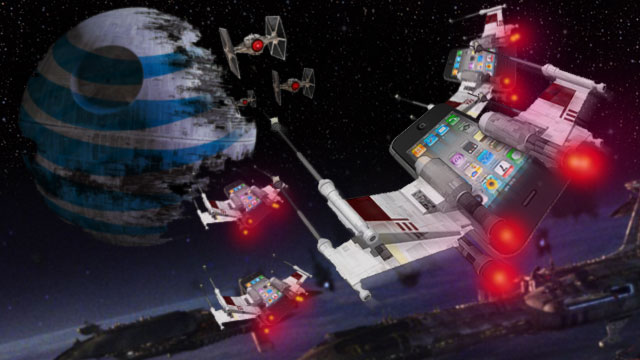 2051
2051
 2017-12-04
2017-12-04

AT&T's push to end net neutrality rules continued yesterday in a blog post that says the company has never blocked third-party applications and that it won't do so even after the rules are gone.
Just one problem: the blog post fails to mention that AT&T blocked Apple's FaceTime video chat application on iPhones in 2012 and 2013. Policy Director Matt Wood of advocacy group Free Press pointed out the omission in a tweet:
I guess you can credit Bob Quinn & @ATTPublicPolicy for having the guts to lie so confidently. But when it says @freepress's 2010 #NetNeutrality predictions about mobile blocking were wrong, AT&T conveniently omits blocking FaceTime on cellular in 2012. https://t.co/zrl4cI2odn
— (((Matt Wood))) (@mattfwood) December 1, 2017
"The rules pave the way for AT&T to block your access to third-party applications and to require you to use its own preferred applications," Free Press said at the time. The 2010 rules imposed fewer restrictions on mobile carriers than on home Internet service providers, which is what raised concerns for Free Press back then.
Quinn says now that Free Press's prediction was totally wrong.
"Of course, none of those predictions ever came true then and they won’t come true after the FCC acts here either," Quinn wrote yesterday.
But in fact AT&T did block FaceTime on its cellular network when users tried to access the application from certain data plans, such as unlimited data packages. Apple made FaceTime work over cellular networks in 2012 with the release of iOS 6, but AT&T said it would only "enable" FaceTime on cellular if you bought a "Mobile Share data plan."
Switching to Mobile Share required unlimited data customers to give up that unlimited perk. Even AT&T customers with limited data plans couldn't access FaceTime on cellular if they weren't paying for one of the then-new shared plans. If you didn't have the right data plan, you had to use Wi-Fi for FaceTime.
AT&T said it was reasonable network management
The 2010 net neutrality rules prohibited mobile broadband providers from "block[ing] applications that compete with their voice or video telephony services." The rule applied except when blocking an application could be justified as "reasonable network management."
Free Press and other groups in September 2012 accused AT&T of violating the no-blocking rule, saying that the reasonable network management exception shouldn't apply. "There is no technical reason why one data plan should be able to access FaceTime, and another not," Public Knowledge Senior Staff Attorney John Bergmayer said at the time.
Of course, AT&T disagreed. There is no "blocking issue" because FaceTime is pre-loaded on iPhones, Quinn wrote in August 2012:
The FCC's net neutrality rules do not regulate the availability to customers of applications that are pre-loaded on phones. Indeed, the rules do not require that providers make available any pre-loaded apps. Rather, they address whether customers are able to download apps that compete with our voice or video telephony services. AT&T does not restrict customers from downloading any such lawful applications, and there are several video chat apps available in the various app stores serving particular operating systems.
Free Press countered that "AT&T is inventing words that are not in the FCC's rules in a weak attempt to justify its blocking of FaceTime." The word "pre-loaded" did not appear in the FCC's 2010 net neutrality order.
AT&T also applied restrictions to Google Hangouts on Android phones.
AT&T eased the restrictions on limited data plans a few months after the initial policy, but unlimited data customers were still blocked from using FaceTime. AT&T finally lifted all these limitations on pre-loaded video apps by the end of 2013.
Quinn justified AT&T's decision to block FaceTime again in November 2012.
"[W]ith the FaceTime app already pre-loaded on tens of millions of AT&T customers' iPhones, there was no way for our engineers to effectively model usage, and thus to assess network impact," he wrote then.
Who do you trust?
But in this week's AT&T blog post claiming that AT&T never blocked third-party applications, the FaceTime blocking did not even warrant a mention. We asked an AT&T spokesperson why this wasn't included, but the company simply pointed us back to its statements from 2012.
AT&T's blocking of FaceTime was cited by the Federal Communications Commission in its 2015 decision to impose stronger rules on both home and mobile broadband providers. The current rules prohibit home and mobile ISPs from blocking or throttling any lawful Internet content, subject to reasonable network management.
Those rules are about to be thrown out, as the FCC's Republican majority has scheduled a December 14 vote to get rid of the net neutrality rules. While Free Press contends that Internet users can't trust ISPs to play fair without the rules, Quinn says that isn't true.
"AT&T intends to operate its network the same way AT&T operates its network today: in an open and transparent manner," he wrote yesterday. "We will not block websites, we will not throttle or degrade internet traffic based on content, and we will not unfairly discriminate in our treatment of Internet traffic."
In short, "there will be no change in how your Internet works after the order is adopted," Quinn wrote.
Source: arstechnica